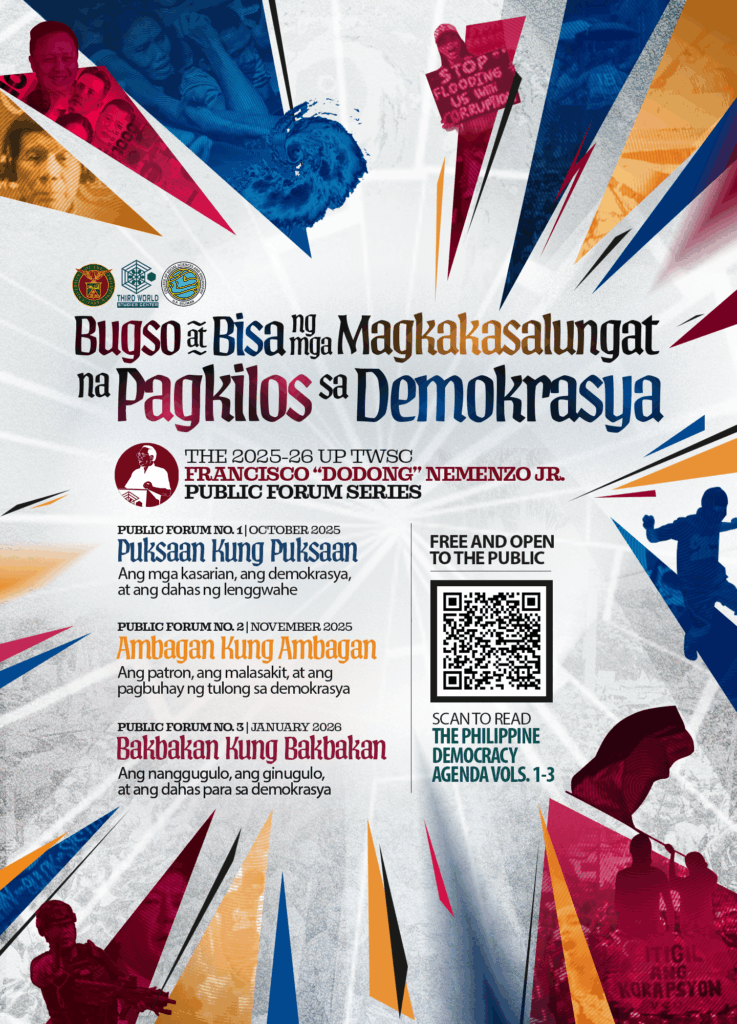𝘽𝙪𝙜𝙨𝙤 𝙖𝙩 𝘽𝙞𝙨𝙖 𝙣𝙜 𝙢𝙜𝙖 𝙈𝙖𝙜𝙠𝙖𝙠𝙖𝙨𝙖𝙡𝙪𝙣𝙜𝙖𝙩 𝙣𝙖 𝙋𝙖𝙜𝙠𝙞𝙡𝙤𝙨 𝙨𝙖 𝘿𝙚𝙢𝙤𝙠𝙧𝙖𝙨𝙮𝙖

In what is now understood to be just the opening salvo in a season of contentious actions against corruption in government, on September 21, 2025, the Filipino people in various parts of the country waded head on to protest the deluge of corruption and abuse in government infrastructure projects, mainly those in flood control. Witnessing this collective capacity to disrupt the unmitigated greed set in place by the corrupt in Malacañang and the political dynasties, one gives in to the optimism of a Philippine democracy revival. There are undercurrents though that both animate and divide the throng of people that went out on the streets—mega rally organizers asserting distinct identities, camps insisting upon a proper way to protest, ideologues and talking heads clashing on the “legitimacy” of those who turned to violence.
Democratic aspirations in the Philippines made waves in the wake of the 1986 EDSA People Power Revolution. Multiple grassroots movements ecstatic over people-centric governance sprang from the euphoria of removing the Marcoses through collective civil action. Democracy became synonymous with “people power.” But more sober assessments after the immediate post-Marcos years have characterized Philippine democracy as clientelistic, neocolonial, and oligarchic. “Fragmented” is also an appropriate qualifier, with how unreconciled differences brew conflict among the democratic publics.
What happens when the idea of a consolidated people power slowly dries out? How do we build people power amidst clashing methods, interests, and worldviews? How is democracy contested and deliberated by those it supposedly gives a voice to?
In the mid-1990s, the UP Third World Studies Center examined the capacity of civil society to drive Philippine democratization in a three-volume series called the Philippine Democracy Agenda. An avenue for interaction of groups and individuals on matters of collective concern, civil society was pictured to include non-government organizations, people’s organizations, religious institutions, and social movements. The Philippine Democracy Agenda focused on examining the potential of civil society for democratic change at a time when post-authoritarian democratization was in its infancy.
But with materializing internal conflicts characterized by deadlocks between progressive parties and conservative institutions, strife over the appropriateness of political lines, and debates on legitimate representation, there is a need to reevaluate not only the potential of civil society but its dynamics as well. It is not enough to ask whether civil society has done adequately in our project of democracy, but we must also shift the discussion on how these contradictions are contributing to the subdued power of the people. Impediments to democratic change do not only come from the corrupt system but from within as well.
Almost thirty years after the UP Third World Studies Center’s Philippine Democracy Agenda, this forum series aims to revisit, recontextualize, and reevaluate its findings in the current Philippine sociopolitical climate. Here we challenge the representatives from various civil society organizations, from non-government organizations, social movements, partylists, and religious institutions, to reflect on their experience and stated agenda and how they have fared and struggled with the democracy they think that we have and to what it still can be transformed into. The public forum series will focus on queering democracy, aid dependency, and political violence.
𝗔𝗯𝗼𝘂𝘁 𝗧𝗵𝗲 𝗙𝗿𝗮𝗻𝗰𝗶𝘀𝗰𝗼 “𝗗𝗼𝗱𝗼𝗻𝗴” 𝗡𝗲𝗺𝗲𝗻𝘇𝗼 𝗝𝗿. 𝗣𝘂𝗯𝗹𝗶𝗰 𝗙𝗼𝗿𝘂𝗺 𝗦𝗲𝗿𝗶𝗲𝘀
Beginning AY 2025-2026, the yearly public forum series of the Third World Studies Center (TWSC), College of Social Sciences and Philosophy, University of the Philippines Diliman shall be called the Francisco “Dodong” Nemenzo Jr. Public Forum Series.
TWSC was the brainchild of Dodong, eminent scholar-activist, who passed away on December 19, 2024. When the Center started as a program in 1977, autocrats were jockeying to lay claim on leadership of the Third World, or the so-called non-aligned or developing states. Ferdinand Marcos Sr. was one such claimant; Dodong, then dean of the UP Diliman College of Arts and Sciences, saw opportunity in the dictator’s ambition. With Randy David, he carved out a space for scholars who, like them, were disinclined to follow orthodoxies, labored to counter imperialist interventions, or resisted co-optation by the fascist “New Society”—a space named, by Dodong’s design, precisely after what the New Society’s chieftain desired to dominate. While later gaining renown for research and publications, TWSC started with colloquia and in-house lectures, gathering thinkers critical of the dictatorship or prevailing discourses on dependency, development, and democracy for incisive and insightful exchanges, contributing to finding emancipatory alternatives. As with the discussions and lectures organized by TWSC since, Francisco “Dodong” Nemenzo Jr. Public Forum Series keeps alive this tradition of timely, unhindered, and purposeful critique.
